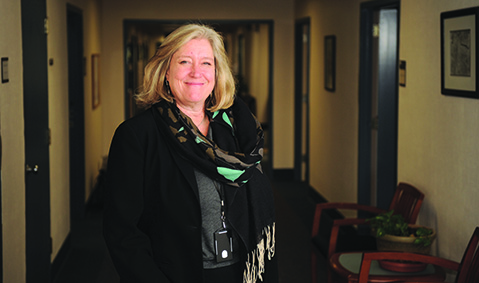Behavioral Health’s ‘Big Bang’
Dr. Alice Gleghorn Takes Over Once-Struggling Department

If all goes as planned for the county’s Department of Alcohol, Drugs and Mental Health Services (ADMHS), 2015 will mean major change. There has already been significant turnaround at the agency — with budget improvements and shorter times to see psychiatrists — but its top priority is reimagining the department in a light that shines brighter on prevention than on crisis treatment.
Helping that mission is a big state grant that ADMHS put toward the rollout of several programs aimed at reducing the need for hospitalization and emergency-room visits: triage teams, a residential respite house, and a 23-hour bed center.
Steering the 400-employee department through this transition will be its newly hired director, Dr. Alice Gleghorn, who came aboard December 8 after working for nearly 20 years for San Francisco’s Department of Public Health. Gleghorn — who briefly attended UCSB before graduating from UCLA — marks ADMHS’s first permanent leader since 2012, when Public Health director Dr. Takashi Wada took over after the departure of Ann Detrick.
On her fifth day on the job, Gleghorn chatted with The Santa Barbara Independent about the department’s transformation — which she dubbed its “Big Bang” — and hinted that ADMHS may soon be rebranded as the Behavioral Health Department. “It’s hard to respond to initials,” she said.
ADMHS has made some major changes recently. What is your vision for the department? Everything that I saw and all the people I met reflected that they were committed to the change in philosophy and approach. I have some experience with systems change in all my previous positions, so I felt this was a good fit and I wanted to be part of it. They’ve got the ball starting to roll.
What did you do in your previous job in San Francisco that could work here? I was up there for 19 and a half years, so I did a lot of different things. I was the lead for San Francisco on implementing the Mental Health Services Act for the first five years. We did have a lot of innovative programs with medication-assisted treatment for substance abuse. A lot of those things are things I’d like to work with the programs here, but I need to spend some time learning the different components of this system and work in a collaborative way to figure out where we go next.
Any programs in particular? Methadone [for heroin addiction] is well-established here, but there are other medications you can prescribe to family members of opiate users to reduce an overdose. That’s an important area I’d like to see. There have been issues with overdose. People have said, “Yes, we need this.”
What drew you to this position? It doesn’t bother me that something is challenging. I know you can typically get there in the end. It may not be there on the time frame you were hoping for to start with, but I have enough experience attending to all the details and pulling all the threads through that you can finally get where you want to go. Sometimes you just have to be a little more patient.



